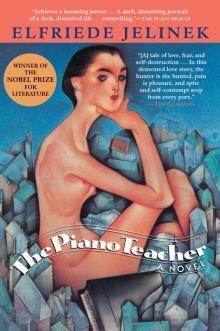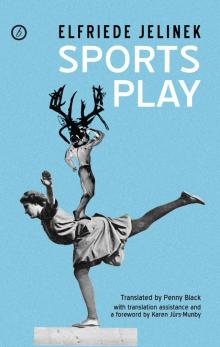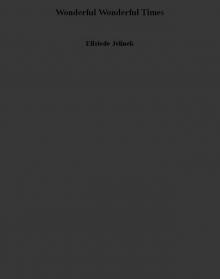- Home
- Elfriede Jelinek
Sports Play Page 4
Sports Play Read online
Page 4
Finally, just like Jelinek inscribed herself into the text in the figure of “Elfi Elektra” and the “Authoress”, Schleef himself inscribed himself in the performance text by appearing in person to speak the final monologue, which was printed on a giant cloth spread over the whole stage (on the third night Jelinek herself spoke the text and in the long version both Schleef and Jelinek walked over the text together). Schleef’s vulnerable, partly improvised performance and the fact that each evening was different, contributed enormously to the event character of the production.
Understandably, Schleef’s impressive monumental production has somewhat overshadowed the production history of Ein Sportstück and few directors and dramaturgs have dared to tackle the play since for fear of comparisons. But Schleef’s quasi-operatic form of a Wagnerian Gesamtkunstwerk that at the same time deconstructs this Germanic tradition, has not been uncontroversial, either. Gitta Honegger, for example, has argued that “Schleef’s mega-mise-enscène dangerously (re)activates what it exposes” (Honegger 1999: 15). In any case, Schleef’s production is certainly not the only way in which the play can be staged and should not deter theatres with fewer than 142 performers and less than multimillion budgets from staging the play.
Just a Must’s English-language premiere of Sports Play, directed by Vanda Butkovic, is timed to coincide with the London 2012 Olympics and before it Euro 2012, i.e. a time when there is definitly “nothing but sport and sport and sport on our minds”, as Elfi Elektra says in the opening speech. This seemed a unique opportunity to commision a translation of the play and introduce it to a British audience.
As a dramaturg, one of my first tasks, in close collaboration with the director, was to shape Jelinek’s massive text into a condensed performance script more closely suited to Shakespeare’s famous “two hours‘ traffic of our stage”. Jelinek’s plays are nearly always cut quite heavily for performance. Even Schleef’s five-hour version of Ein Sportstück did not use the unabridged text, as one might suspect, but acquired its length because he inserted his own extraneous material. As director Nicolas Stemann once said rather flippantly about the necessity of adapting a text by Jelinek: “You don’t cut it with a pencil as with other theatre texts where you may draw some lines. No, with Jelinek’s texts you have to cut with a machete!” (Stemann 2006: 67). With this exhortation in mind, we took heart to make sometimes painful cuts to the text. The principles that guided us were a focus on the main theme of sport and on themes that were recognizable and resonated with British audiences, while nevertheless trying to preserve the main compositional architecture of the play. Somewhat reluctantly we decided to cut the long monologue of the Old Woman, based on serial killer Elfriede Blauensteiner, because we felt that her “sport of killing” was rather tenuously linked to the main theme and the audience would not have the necessary background to make sense of it. We made the dramaturgical decision to split Achilles’ and Hector’s scene into three shorter appearances, each time playing a different sport, thus turning them into a kind of running “sideshow”. We also heavily condensed a long section of individual “perpetrators” and “sportsmen” into a devised final choric scene (as Schleef had done with his “Sportsmen chorus”).
Vanda Butkovic decided to stage the play with a group of seven performers, six of whom in addition to individual roles also act as the chorus and are present on stage throughout the play. The “chorus” changes from being commentators, to “team”, to crowd. Performatively we also played with shifting between the performers playing “themselves”, being “text bearers” and becoming “characters”, underlining the visible construction of characters that is also evident in Jelinek’s text itself. In this way, group dynamics sometimes emerge seamlessly from performer dynamics.
Simon Donger’s ingenious set design, consisting of 140 Kilos of white toy stuffing, creates an ever-changing landscape in performance. Depending on its use and context in each scene, the “fluff”, as we nicknamed it, may bring up asscociations of snowy mountains, sportsfields or battlefield, the candyfloss sugar coating of the Olympics or the “stuff” that artificially enhanced bodies are made of. It is ultimately left up to the audience how they choose to read it at any moment. The toy stuffing, which also at times becomes a projection surface, also underscores the theme of the commercial manufacture of sports events by corporations and the media.
True to Jelinek’s suggestion in the opening stage directions that “whoever appears on stage has to wear sports clothes – which leaves the field wide open for sponsors, does it not?”, the sports costumes of the performers (designed by Meni Kourmpeti) are uniformly sporting the logo of our official sponsor, Stiegl, a Salzburg brewery. As none of the multinational sports clothes manufacturers (“Adidas or Nike or whatever they are called, Reebok, Puma or Fila or so”) would have entertained the idea of sponsoring Sports Play due to adverse publicity, we considered it a certain delicious irony to have a brewery as a sponsor – especially since the Olympic Committee has (rather absurdly perhaps) banned all alcohol advertising during the games.
From the start, the production introduces itself as a translation by giving the first word to Jelinek herself, as her voice is heard speaking the first lines. As a framing figure who introduces and concludes the play, Elfi Elektra serves as the author stand-in. While Schleef had cut Elfi Elektra’s opening speech altogether (hoping to make use of it in a future production), in our production this figure gains additional weight by being present on stage throughout, observing from the sidelines and occassionally stepping into the action. Her distance to the chorus also underscores one of the main dynamics in the play, the opposition between the solitary individual and the group or the mass.
When working on the extended part of the Chorus, we treated the choric performance of the text as a musical composition, trying to avoid pyschological illustration and instead working with variations of rhythm, tempo, acceleration and deceleration, dynamics, elongations, repetitions, changes between male and female, tutti and solo voices etc. The result, we think, is a kind of Olympic feat of the performers, not only in terms of memorising Jelinek’s difficult linguistic gymnastics but in performing it chorically as an ensemble in a highly disciplined fashion. Generally, not only in the choric passages, we played with the concept of “performance under duress”: performers are having to deliver the challenging long monologues while going through exercise regimes, while being hassled or bullied by other performers or while being under the “fluff” or surrounded by it. All this amounts to a peculiar sporting discipline in itself.
We worked on maintaining openness towards the audience, who are frontally addressed, implicated and appealed to by the performers in various ways throughout the piece. We aimed at blurring the lines between a sports event and a theatre event, in as much as the audience is often treated as a sports audience, for example, through the live reporting of sports results.
Finally, we also strove to bring out the humour in the text. Jelinek, who considers herself a comic writer, often complains that many productions and frequently the reception of her plays miss the humour in it. Discovering the humour in her writing, we found, is actually something that comes relatively easy to British actors, as there is such a great tradition of punning language play, irony and satire in this country.
Jelinek once remarked that translations are books that nobody had missed before they were there. Having now worked with Sports Play in rehearsal for several weeks, we would certainly not want to miss it anymore. We hope that in watching the English premiere and reading the full-length text printed here you, too, will discover what a treasure you have (not) missed all these years since its original publication.
1 The last play that received a professional performance in Britain was Services, or, They all do it, directed by Annie Siddons at the Gate Theatre, London in 1996. A regularly updated list of all worldwide translations of Jelinek’s works, collated by the Jelinek Research Centre, Vienna, can be accessed at http://www.elfriede-jelinekforschungsz
entrum.com.
BIBLIOGRAPHY
Canetti, Elias, Crowds and Power (1981 [1962]), trans. by Carol Stewart, Middlesex/New York: Penguin.
Fiddler, Allyson (2001), “Theorizing and ‘Playing’ Sport in Elfriede Jelinek: Some Notes on Ein Sportstück”, in W.E. Yates, Allyson Fiddler, John Warren, From Perinet to Jelinek: Viennese Theatre in its Political and Intellectual Context, Oxford/New York: Peter Lang, pp. 273-283.
Honegger, Gitta (1999), “Beyond Berlin, Beyond Brecht: Offenbach, Horváth, Jelinek and their Directors”, Theater, 29, pp. 4-25.
Honegger, Gitta (2006), “How to get the Nobel Prize without really trying”, Theater 36 (2), pp. 5-19.
Janke, Pia (2002) (ed.), “Die Nestbeschmutzerin: Jelinek & Österreich”, Salzburg/ Vienna: Jung und Jung.
Jelinek, Elfriede (2006), “I am Trümmerfrau of Language”, interview by Gitta Honegger, Theater 36 (2), pp. 21-37
Jelinek, Elfriede (2012), Interview with Simon Stephens, trans. by Karen Jürs-Munby. Published in this volume.
Jürs-Munby, Karen (2009), “The Resistant Text in Postdramatic Theatre. Performing Elfriede Jelinek’s Sprachflächen”. In: Performance Research 14 (1), Performing Literatures, pp. 46-56.
Lehmann, Hans-Thies (2006 [1999]), Postdramatic Theatre, trans. and with an introduction by Karen Jürs-Munby, London: Routledge.
Nobel prize entry (2004) on laureate Elfriede Jelinek, http://www.nobelprize.org/nobel_prizes/literature/laureates/2004/
Schleef, Einar (1997), Droge Faust Parsifal, Frankfurt a.M: Suhrkamp.
Stemann, Nicolas (2006), “Das ist mir sowas von egal! Wie kann man machen sollen, was man will? – Über die Paradoxie, Elfriede Jelineks Theatertexte zu inszenieren”, Stets das Ihre: Elfriede Jelinek Arbeitsbuch 2006, ed. Brigitte Landes, Berlin: Theater der Zeit, pp. 62-68.
Translator’s Note
by Penny Black
Translating Sports Play has been like running uphill in the fog and rain across an obstacle course filled with booby traps. Each day I sat down at the computer and translated – without the reassurance of character ‘voice’, established rhythm, sentences that ran fluently and comprehensively from one to the next, images that made sense. Each day I forced myself to tackle puns, word games, alliteration, abrupt changes of style, words that have three different meanings, and each day I tried not to be distracted by the thought of how brilliant Elfriede Jelinek is – a douse on any creative thinking – but to just tackle the text. And to feel the freedom in the words that Jelinek so clearly feels as she puts them on the page.
The result is before you. There will be some inaccuracies, sentences I might translate differently in two years’ time, alliterations galore, paragraphs of brilliance, sentences of confusion, moments that are truly moving. I have been careful with commas, thoughtful with abbreviations, and tried to find the middle road between the disrupted German of the original and a speakable but nevertheless splintered and surprising English.
I would also like to say a particular thank you to the dramaturg, Karen Jürs-Munby. The electronic airwaves – and nightwaves – zinged with the to-ing and fro-ing of text, with corrections and suggestions and references and research. This playtext would not be what it is without this collaboration and input from a Jelinek expert.
As for Elfriede Jelinek herself, I imagine Sports Play is like a sourdough, there are sections that will be used for performance, sections that will be handed on to friends, sections that will be binned. And that, I feel, is the correct way to approach this text, whatever you want to do with it.
The author doesn’t give many stage directions, she has learned her lesson by now. Do what you like. The only thing that has to be kept are the Greek Choruses, as individual, or en masse; whoever appears on stage, has to wear sports clothes – unless otherwise specified – which leaves the field wide open for sponsors, does it not? The Chorus, if possible, should all be the same, all Adidas or Nike or whatever they are called, Reebok, Puma or Fila or so.
What I want from the Chorus is the following: the leader of the Chorus should be connected to a sports channel by means of an earpiece and should inform the audience of all the interesting sports events or latest results, according to their own assessment. Or the leader of the Chorus could come up to the lights and announce what he/she wants to say by writing it on boards that he/she then holds up, or, the slightly more expensive version, one of those electronic boards with neon letters, where you put the information in via computer. So the leader of the Chorus (male or female) needs to be someone who can improvise well, will go up to the footlights and interrupt the play by passing on the latest news, which the Chorus should then take up and repeat chorically. And to do it in a manner that interrupts the plot – there isn’t one anyway.
With regards the stage itself, it could perhaps look like this: it could be divided right down the middle in two sections: a dismal sports stadium towers above us, there are railings to keep the two sets of fans off each others’ throats. On either side of the railings stand policemen with their backs to the railings watching the faces of the two sets of fans who want to break through, push towards each other, hit the railings, sometimes burst through the railings. The two crowds are the two enemy masses, whose attacks on each other are what the play is about, or maybe it is about something else.
ELFI ELEKTRA:
Peace at last. The rivers, coloured red by my father’s blood, have run clean again, or maybe a new war is about to start with mama? What do I care. Meanwhile and for a while the behaviour of the masses is drawing my attention. So many people with personal drive. Then, all at once, as if the stroke of an invisible clock had smashed something in their skulls and reset them to an imaginary time, they are all ticking to the same beat. They grab their sports equipment and thrash each other, smash the bowls that previously they’d held up in front of a prettily-set breakfast table or in the pub, in order to take a swig from their neighbour’s. Well, cheers! Now they’re giving him one, and how! Bottoms up! Heads down! Trout float past the bridges with their bellies up. They’re no longer to be considered for the tourist industry, because tourism consists of consideration, and here there’s really nothing more to see. Move along, to the next village. The fish are dead and gone. Please move along! Do you know what’s going to happen to the river in my nearest neighbourhood tomorrow, or at the latest, the day after? Do you know what they’ll do with it, these inhumans? They want, by means of artificial artlessness, to make it unique, more unique at least than all those people who hang up their ties on a hook to change into their uniform – sports gear. To this end people must first destroy their unique nature, or maybe this is how it appeared in the first place? It happened so everyone could really absolutely look uniform. Like soldiers. Jeans, T-shirts, baseball caps. The same thing’ll happen to the poor river: a completely new set of kit for the Olympics in the discipline “bank bursting”. Out of it the masters of the river create natural artlessness – or better still, artful naturalness. Admittedly, even if a new bed is sewn for the river, it remains the old one, the malicious one with the hard bandages that won’t be nice for its joints. First it has to be environmentally-protected before it can become a river again. Of course it moves much more happily in its new garb. Something always has to happen before we get round to making the rivers reasonable. Please, I don’t care, I’m just saying, although it makes no difference what I say: this river has been flowing for a good century in its well-built concrete river bed, at high watermark it rises by about thirty centimetres and begrudgingly lets it go again afterwards. And now they want to rip out its bed, let it go back to nature. The river, as in the old days, can once again meander, and its banks should have perfect suction and be shapely at the same time, perhaps not precisely shapely, but at least biologically-fitted to the body of the landscape. With enhanced suction at its core. I’m looking forward to it, although I do have some objections against it. Its swooshing will make a sound like dogs howling, no, not quite that loud, of course every child at p
lay will drown it out. Those lost on the battlefield have also been given their provisionally final monument – it’s been fiercely fought over, as though it wasn’t already a reminder of cruel, unimaginable battles. Many have, and I too, have objections. Who against whom? No one listens to me anymore, because when I speak, I contort myself as self-pityingly as I do during my individual gymnastic lesson with the latest self-assembled music: a goddess, who cannot and cannot bear children. So I’ll sit back down. Doesn’t matter. The army sets forth having destroyed the land. The last ones crawl.
Underneath the earth they lie close together. In fact some of those still waging war today go so far as to say that their one-time enemies, snuggled up tight, are still hostile, so they can continue to threaten even the dead. “They don’t threaten us anymore but we can still threaten them.” It’s the same with the water. It doesn’t threaten us anymore, because even though it’s constantly on the move, it’s dead, but we threaten it with what it is, namely dynamic, quickly rushing-forward nature! We threaten to return it to its very nature, but the river has that already, in different software versions in fact. I have accessed my own versions like a thief. You just can’t give the right present to some children. No one can seek out a nature different to the one they already have. Dead means dead, papa! And that includes you, too, there’ll be no mercy. We, the living, don’t need any corpses nearby, we want to eat our cake without being watched. Stalin and Hitler have been tidied away, General Mladić had a stroke and still doesn’t know if he’ll be alive when, what’s said here, will remain unsung. Yet he’ll be a celebrity for some time to come. And what on earth will happen to that well-known poet Karadžić, who’s at least as good as my friend Fredi K and whose lips stand as wide apart as his hair? He’ll probably only perform occasionally, or might not be allowed to perform at all following the reduction in the body of his own people, which really wasn’t necessary. He reduced the body of other peoples more though, which seemed to him so essential that he couldn’t wait for them to die of their own accord. They did complete all their exercises beforehand however. Nothing lasts forever, everything comes to an end, only a sausage has two. Please applaud all these gentlemen nicely because this is the first and the last time that I’ll be talking about them. Even though you may have expected more commitment from me on the matter. Well. I’m deliberately not going to get involved. I will accept this applause even though those heroes of history deserved it more, the ones who are almost forgotten today, because we’ve already got new ones in stock. One moment, I just have to unpack them and accuse them of craving recognition – but it’s dying on my tongue. Making accusations is something I do all the time, it’s my trademark, but the accusations were already tame when I let them out of my cage, naked wild beasts on all fours who I alone made so wild. Cuckoo! I find objections as comfortable as a double-edged sword in my belly.

 The Piano Teacher
The Piano Teacher Sports Play
Sports Play Lust
Lust Greed
Greed Wonderful Wonderful Times
Wonderful Wonderful Times